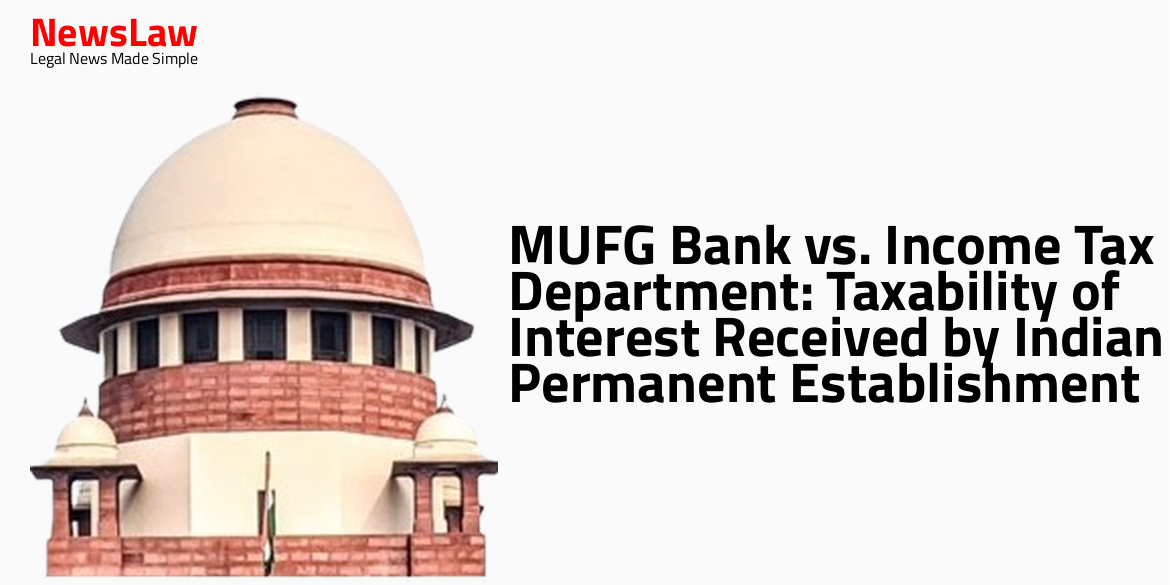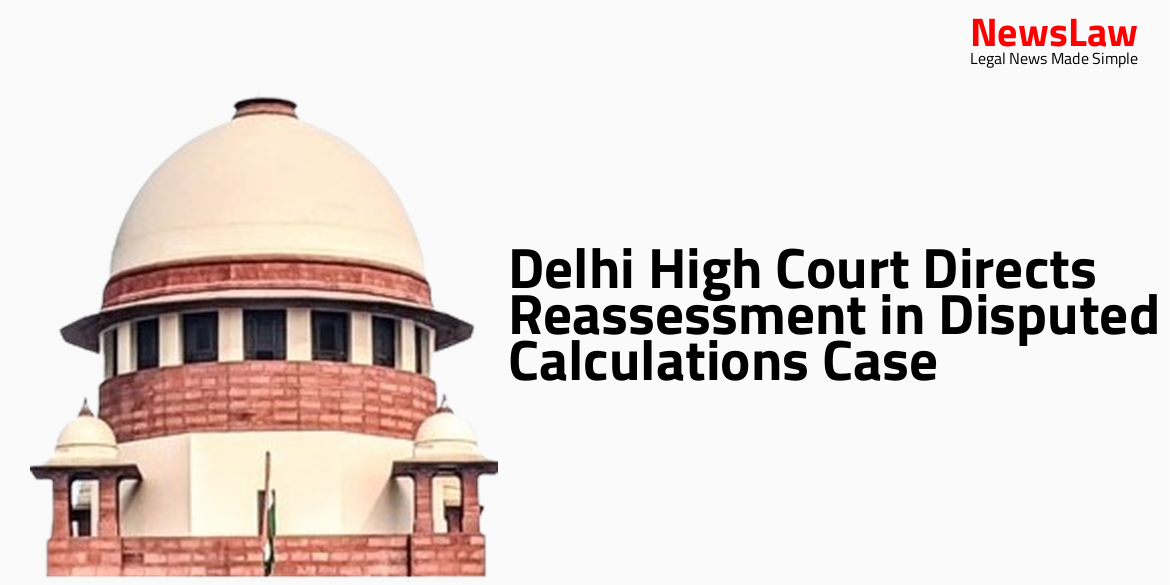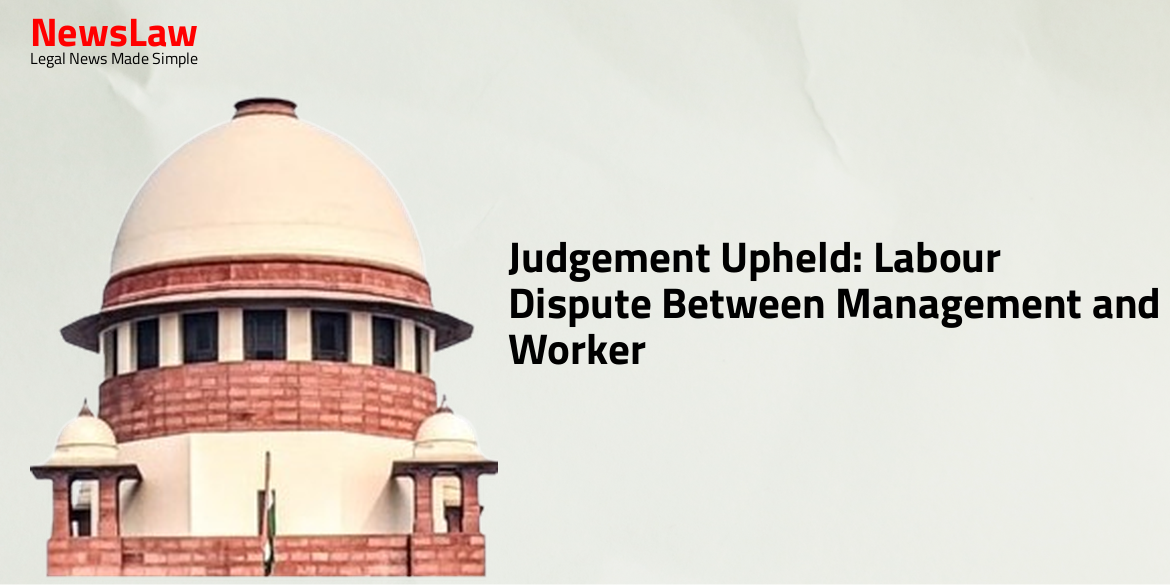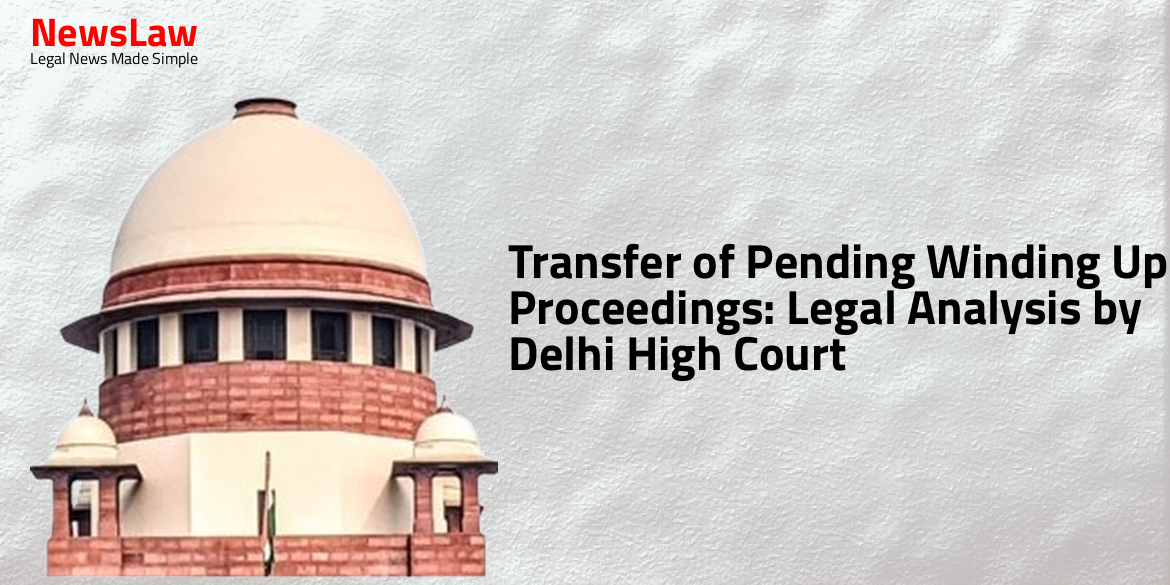In a recent case before the Delhi High Court, the issue of taxability of interest received by the Indian Permanent Establishment of MUFG Bank was deliberated upon. The court’s decision has overarching implications for how Permanent Establishments are taxed in India. Let’s delve into the details of this intriguing legal battle.
Facts
- The orders passed on 08 April 2016 on ITA 604/2015 and ITA 605/2015 would bind parties in relation to the first four proposed questions.
- Ground No 5 of the appeal of assessee for both years is allowed.
Issue
- The issue under consideration is whether the interest received by the Indian Permanent Establishment (PE) of MUFG Bank from deposits maintained with its overseas branches and Head Office is taxable in India.
- The Court noted a prior decision on the same issue rendered on April 8, 2016, which was considered determinative.
- As a result, the appeal now focuses solely on Question (v) which pertains to the taxability of interest received by the Indian PE from deposits maintained with the Head Office/Overseas Branch.
- This particular issue arose during the Assessment Year 2003-04.
Arguments
- Branches do not have a separate legal entity according to the submission.
- The taxability of the interest received must be in favor of the assessee as per the argument presented.
- Cited relevant observations from the Bombay High Court in DIT (I.T.) v. Credit Agricole Indosuez.
- A similar issue admitted by the court in DIT v. Antwerp Diamond Bank N. V. based on the submission by the learned counsel for Revenue.
- Discussion on Article 7(2) of the India-US DTAA regarding attribution of income to a PE.
- The Revenue’s question was about the chargeability to tax of interest received by the Indian permanent establishment from its head office.
- The contention is that the Indian permanent establishment and the head office are treated as one entity, so profit cannot be made out of oneself.
- Citing the case of Sir Kikabhai Premchand v. CIT, it is argued that interest received from one’s own head office is not taxable.
- Referring to the decision in Sumitomo Mitsui Banking Corpn. v. Deputy DIT, it is emphasized that man cannot make a profit out of himself.
- In the specific context of the Antwerp Diamond Bank N. V. case, deduction on interest paid to the head office was discussed based on the Indo-Belgium DTAA.
- The Tribunal’s decision in Antwerp Diamond Bank N. V. case was part of the Sumitomo Mitsui Banking Corporation case.
- Paragraph 50 of the Sumitomo Mitsui Banking Corporation case states that interest received by the assessee from its own head office is not chargeable to tax.
Analysis
- The branch office and the foreign general enterprise are not separate entities for tax purposes.
- Interest payable by the Indian permanent establishment to the foreign general enterprise cannot be treated as expenditure as it is a payment to oneself.
- Article 7(3) of the treaty makes special provisions for banking enterprises regarding deductions.
- The provisions of the India-US Double Taxation Avoidance Agreement govern the taxability.
- Income generated from self, such as interest paid by a branch to its head office, is not considered taxable in the hands of the bank.
- The Explanation to Section 9(1)(v) introduces a legal fiction for banking enterprises regarding payments to the head office.
- The amendments to the Act from 1 April 2016 clarify the tax implications for PE remittances.
- Certain DTAAs, like the Indo-USA DTAA, have specific provisions for taxation of interest paid by a PE to its head office.
- The legal fiction in tax treaties must be interpreted broadly to avoid base erosion.
- The CBDT Circular No. 740 clarified the separate taxation of interest payments from a PE to the head office.
- Article 7 of the India-US Double Taxation Avoidance Agreement (DTAA) addresses the determination of profits for a permanent establishment.
- Expenses incurred for the purposes of the permanent establishment, including executive and general administrative expenses, are allowed as deductions.
- No deductions are allowed for payments made by the permanent establishment to the head office for royalties, fees, commissions, or interest, except in the case of a banking enterprise.
- The profits attributed to a permanent establishment should reflect what it would make if it operated independently.
- The India-Netherlands DTAA and India-Japan DTAA also incorporate similar provisions regarding deductions for a permanent establishment.
- In case of banking companies, specific provisions apply regarding interest paid by the permanent establishment to the head office.
- The Income-tax Act has been amended to address non-resident banking entities operating through permanent establishments in India.
- The Act requires tax deduction at source on interest payable by the permanent establishment to the head office or other branches of the non-resident.
- Non-deduction can lead to disallowance of interest claimed as expenditure and may incur interest and penalties.
- The Explanation to Section 9(1)(v) of the Act clarifies the tax implications for non-resident banking entities with permanent establishments in India.
- In revenue cases, substance of the transaction is considered over form.
- Business should not be separated from its owner in tax matters.
- Fictional sales creating fictional profits are deemed unreal and artificial.
- For tax purposes, selling to oneself and showing a profit is absurd and against mercantile and income tax laws.
Case Title: THE COMMISSIONER OF INCOME TAX-INTERNATIONAL TAXATION-3 Vs. THE BANK OF TOKYO-MITSUBISHI UFJ LTD. (2024:DHC:4329-DB)
Case Number: ITA-887/2018



